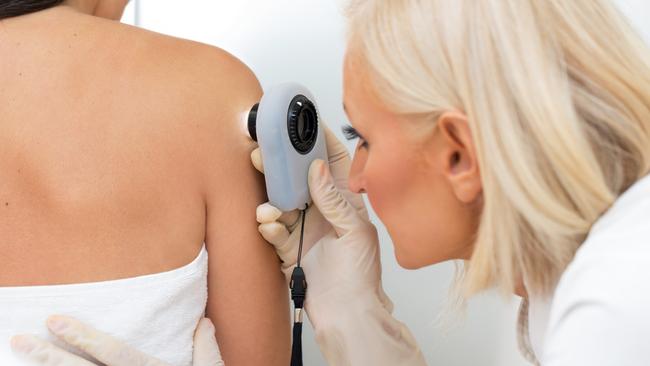Qld melanoma breakthrough uses tarantula, horseshoe crab peptides
Queensland scientists have made a groundbreaking discovery into how to treat challenging drug-resistant advanced melanomas.

Lifestyle
Don't miss out on the headlines from Lifestyle. Followed categories will be added to My News.
Queensland scientists have made a groundbreaking discovery into how to treat challenging drug-resistant advanced melanomas – and tarantulas have played a critical part.
QUT researchers based at Brisbane’s Translational Research Institute have modified the anti microbial peptides from the Brazilian tarantula and the Japanese horseshoe crab and found they can kill samples of melanoma cells derived from a cancer model in mice that are resistant to other cancer therapies.
The preclinical study, published in the prominent journal Pharmacological Research, found that the two very similar peptides not only kill resistant melanoma cells, but the cancer is incapable of developing resistance to the peptides.
Study author QUT Associate Professor Sonia Henriques said that although the study is preliminary with much more research to be done, the results are exciting because drug resistance in melanoma is a huge challenge.
“Nature designed these peptides to fight bacterial infection by targeting the cell membranes of the bacteria. We have modified the peptides and applied them to cancer cells to act in a similar way and attack the cancer cell membrane without impacting non-cancerous cells,” A/Prof Henriques said.
“The most exciting aspect of our study is that the peptides not only kill highly proliferative melanoma cells, they also kill the dormant cells and those that have gained resistance. And because the peptides target the cell membrane in tumour cells and kill them via a fast mechanism, cancer cells did not remodel their cell membrane composition or develop resistance to peptide treatment.
“This is potentially significant because the main issue in treating cancer patients is that they eventually gain resistance to their current therapy,” she said.
The study conducted in both in vitro (laboratory-based cancer cells) and in vivo (mice) models represents ten years of work and paves the way for further research to make the peptides more potent.”
Study first author QUT’s Dr Aurelie Benfield says it’s inspiring how thousands of years of evolution in nature can provide such promising pathways to improve human health.
“It is amazing because there are so many peptides in nature and they inspire us as scientists to modify them and make them even more potent and stable,” Dr Benfield said.
“I am very proud of this work and the results achieved and now that it’s published, I hope it is the beginning of a great new future for therapeutic peptides,” she said.
The team expects the further research required to improve the molecules will take at least another five years before human clinical trials can commence with a variety of pre- clinical tests required.





